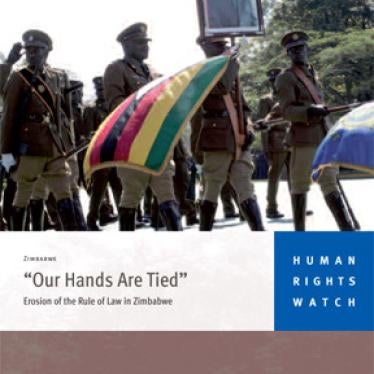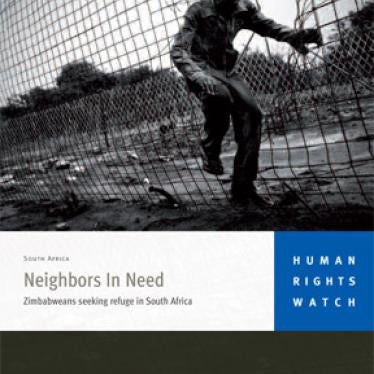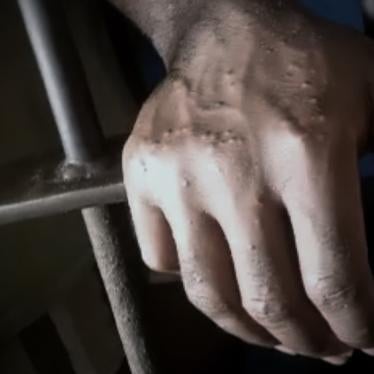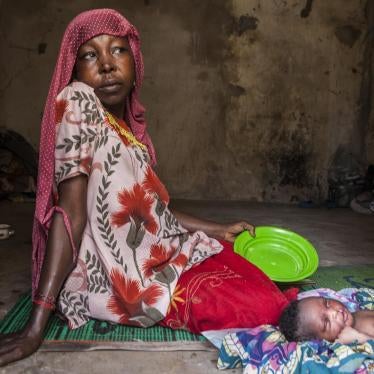(Johannesburg) - The South African government should end its sole reliance on an overburdened asylum system that protects only a tiny fraction of the more than a million Zimbabweans who cannot return to the humanitarian disaster in their home country, Human Rights Watch said today. Human Rights Watch renewed its call on the South African government to stop deporting Zimbabweans and, in recognition of their protection needs, to grant them temporary status and work rights.
To avoid deportation from South Africa, Zimbabweans currently have no option but to claim asylum, placing even greater pressure on a system already struggling to process refugee claims according to international standards. Current estimates based on reported figures place the number of Zimbabwean asylum claims lodged during the last five months of 2008 in the border town of Musina at between 25,000 and 30,000. This is close to double the total number of Zimbabwean claims made in all six of South Africa's refugee reception offices in 2007. It is also more than half of the total number of asylum claims made by all nationalities in South Africa in those offices the same year. South Africa's asylum system has well over 100,000 unresolved asylum cases.
"Flooding the asylum system with Zimbabwean claims puts all refugees in South Africa at risk of being unable to lodge their claims or of having their cases incorrectly rejected," said Gerry Simpson, refugee researcher at Human Rights Watch. "It also utterly fails to address the needs of well over 1 million Zimbabweans in South Africa."
In its June 2008 report, "Neighbors in Need: Zimbabweans Seeking Refuge in South Africa," Human Rights Watch examined South Africa's misguided treatment of Zimbabweans fleeing political violence, mass forced evictions, and economic deprivation, treating them as mere voluntary economic migrants. It also showed how South Africa's dysfunctional asylum system fails to adequately examine many claims and how it prevents applicants from lodging claims. It further showed how the often-unlawful deportation of more than 250,000 Zimbabweans a year means South Africa violates the most basic principle of refugee law, the right not to be forcibly returned to persecution.
"The government pretends that its buckling asylum system is the solution to the needs of over a million Zimbabweans in South Africa," said Simpson. "It clearly is not working. To effectively protect Zimbabweans and to stop violating international law, the government needs to halt deportations and to grant Zimbabweans temporary status."
Background
Human Rights Watch has regularly documented systematic human rights abuses in Zimbabwe, including rampant political violence and the routine arbitrary arrests and detention without charge of political opponents of the ruling Zimbabwe African National Union-Patriotic Front (ZANU-PF). In its November 2008 report, "‘Our Hands Are Tied:' Erosion of the Rule of Law in Zimbabwe," Human Rights Watch documented how ZANU-PF has compromised the independence and impartiality of judges, magistrates and prosecutors and transformed the police into an openly partisan and unaccountable arm of ZANU-PF.
Zimbabwe is in the midst of an unprecedented humanitarian crisis, with an almost total collapse in health service delivery over the past four months. The main public hospitals in Harare, the capital, have shut down, and there are acute shortages of drugs and hospital staff throughout the country. Deaths from cholera outbreaks in Zimbabwe's main cities and townships have mounted, as water and sanitation services have collapsed.
According to the World Health Organization, by the beginning of January, 2009, 1,732 Zimbabweans had died from cholera and more than 34,000 had been infected. New outbreaks are expected as the peak rainy season in January and February brings floods. UNICEF estimates that the number of cases inside Zimbabwe will soon reach 60,000 or more.
The country is also facing severe food shortages, with at least 5.1 million people in urgent need of food aid and the world's worst inflation rate (231 million percent in July 2008).








